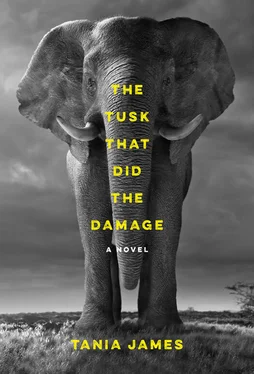For us he painted prison in similar shades:
At 6 we get chai in our cells. At 630 we go into compound and you can play chess or carrom or read the paper. I read the paper. There are 3 std phone booths. Nice library. One man here for 15 years he got his LLB and two other degrees in jail. I would school myself in the law if I did not hate all lawyers so much. I could get better advice from the ceiling.
None of us believed that jail was the luxury law school of Jayan’s description. Still we were most unprepared for our maiden visit.
In the week prior, my mother and Leela had built a feast that would fill my brother’s belly ten times over, with jars of achar, both lemon and mango, and sambar and avial and rice. Half of it spoiled in the heat while we waited to obtain security clearance. Three hours of standing for thirty minutes of staring through a metal web so thick our hands could not touch his. I finally understood why he had kept us from coming so long. To see him in this state made my mother lose her speech.
For he was someone else, my brother, eyes bulgy as a drunk’s, collarbones so high you could snap them like pencils. Even his manner of speech had changed, rambling on and on so as to leave no room for response. All he wished to discuss was the barbarity and indecency of the Karnataka justice system. In Karnataka, 30 percent of the inmates were innocent. In Karnataka, if a man killed himself, his wife was arrested as an accessory. In Karnataka, you could get six months for smoking.
Fat lot of good to claim innocence when the whole of Karnataka begged to differ. Of course my mother and Leela said no such thing, nor did I. Mostly we kept our commentary to How are you? and What can we bring you? We well knew the answers, but there was such yearning in those thirty minutes, such blind desperation as the time ran dry.
At one point he turned his red eyes on me. “What happened to your nose?”
“Nothing.” My hand went to my nose, where a welt remained from last month’s bout. “I punched someone.”
“You?”
“Why not me?”
“Over what?”
Leela pierced me with a look. I had lied to both her and my mother, but one glance at my ramshackle face, and Leela had known.
“Mugged.” My mother sighed. “Can you imagine? In the broad light of day.”
As the years went by, we drew hope from whatever lightless corner we could. When the newspapers told that Karnataka would pardon a lotteried pick of prisoners on November 1, in celebration of the state birthday, we waited for lots that were never drawn. When Jayan dismissed his lawyer, we hired another, but they were mosquitoes, those people, always buzzing in your ear and at the same time bleeding you dry.
By the time Jayan was freed, I was a young man of nineteen, my hopes for college on hold. I had told myself I would pursue my degree as soon as Jayan came home, but I had not foreseen what captivity could do to a man over the course of four years.
All his swagger and ease had worn off. He had a guarded look about him, the flinch of a hunted thing. He slept all day and smoked all night, as if to make up for the bidis he could not buy in prison. He was both familiar and strange to us, as we must have been to him.
I avoided my brother, but the women handled him more delicately. My mother moved around him with care, and Leela rushed to his side if he so much as belched, as though he were a spill about to run off the table’s edge. She tacked his name to the end of every sentence as if to remind him of it.
One night I heard him talking to Leela in a voice mean and muttery. She wanted him to go with her to temple for the Sita Devi Festival, the grandest hullabaloo for miles, but Jayan was in no mood. “I might as well have THIEF tattooed on my forehead, that is how everyone looks at me.”
“So let them look. We have nothing to hide now. All the time you were gone I kept my chin up. I worked. I bent my knee for no one.”
“Who gave you the cow and the chickens?”
“I bought them.”
“With what money?”
She paused. “My wedding chain.”
A long, vast silence.
“You should have left,” he said.
“And go where? Who would have me?”
“Your sisters.”
“They would have my money but they would not have me.” A muttering from Jayan. “You know why. And anyway, they can’t give me children.”
I heard my brother carefully clear his throat.
“I am tired of waiting,” she said. “You promised me a life.”
Jayan said nothing. Her voice shifted to a different key, all soft and wanting as she asked, Should I be more specific? … thus leading to the sort of commentary that robbed me of sleep.
As the months sped on, Jayan seemed to grow into a sturdier self. He resumed his work in the fields, and I often went with him, leaving Raghu behind. Even when Raghu invited me to watch Junior Mandrake at his house, on their brand-new LG TV, I said I was tired, having worked beside Jayan all day, Jayan who never tired or paused for a drink.
“But it’s starring Jagathy,” Raghu said. “You like Jagathy.”
“I like my bed better.”
Raghu rubbed one skinny foot with the other. “You never help out at our place anymore.”
“You already have enough help.”
“Well, Father says you have to sit in the palli with me tonight.”
“Tonight? I’m too tired.”
“Not too tired for that pumpkin of yours.” He raised his voice loud enough for my mother to hear. “What’s her name — Kamini? Yamini?”
I told him to go screw a stone.
To be clear: I did not know “screw a stone” would be my final words to Raghu, my cousin-brother and truest friend, who had saved my life not long before he lost his own. It gnaws at me still that I did not go to meet him that night, but the worst thing I did was to witness the hurt in his face and walk away.
§
Six months after my brother was released, my cousin was killed.
In the days after his death, Raghu appeared at temple and in the fields and one time on the back of a lorry. I had been similarly visited by my father for a while. I once chased a public bus, sure I had seen my father inside taking the tickets.
Work was the only wall I could lean against. Given my mother’s permission, I took to toiling in Synthetic Achan’s fields, as he was short a pair of hands. Not that my uncle wanted mine. He abominated my very presence and would not glance my way, not even when he uttered an order, not even when I said, at the end of the day, “I’ll go and come,” to which he issued not even a grunt. I poured my sweat into his soil and came up with a possible solution for the parakeets that came cackling out of the sky and into the rice. One whole morning I spent staking two poles along the eastern side of his farm and twisting a long length of white plastic between them, strung with bottle caps and bells. The plastic flashed and glimmered, jangling in the breeze. My uncle asked if I was scaring the little shits or throwing them a party.
At night I lay awake thinking of the Gravedigger, a name I had known since childhood along with its other titles. Schoolchildren had set its killing spree to song:
Here it comes
the Ottayan, the Undertaker
Sent its master
to his Maker
What had that master done, I wondered, to give his elephant such a fiending for death?
In the days that followed, the Gravedigger took one more palli and one more soul. The palli belonged to a farm down the way, its walls crashed to kindling. The man inside escaped and lived to feed us a dubious story: I was lying on my side by the fire lost in a daydream when I felt a sniff at my ear so gentle I half thought it was my wife, though, honestly speaking, she would sooner fart in church than show affections, so I turned and found myself faced with the Gravedigger’s big fat hose! I did not think, I drew back my fist and punched it— dsh! — in the nostrils. Naturally it was not expecting such heroics, for it snatched its trunk away, giving me just enough time to jump out and run.
Читать дальше












